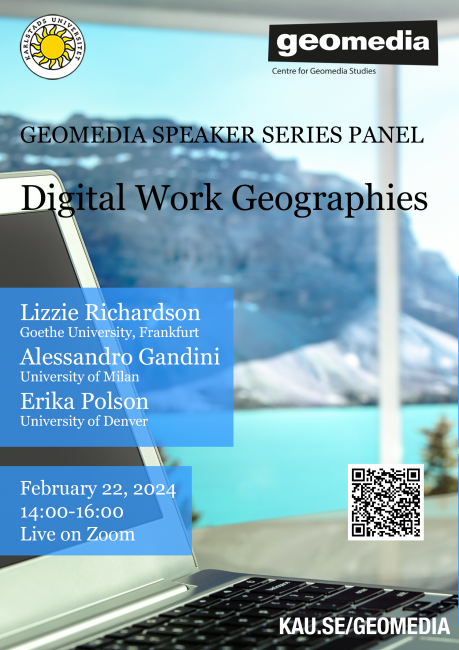SPEAKER SERIES - LIZZIE RICHARDSON, ALESSANDRO GANDINI AND ERIKA POLSON

LIZZIE RICHARDSON, GOETHE UNIVERSITY, FRANKFURT, ALESSANDRO GANDINI, UNIVERSITY OF MILAN AND ERIKA POLSON, UNIVERSITY OF DENVER
- February 22, 2024
- 14:00-16:00
- Live on Zoom
Work is undergoing rapid changes, partly due to technological transformation. This Geomedia seminar brings together leading scholars in the field to discuss how work and workplaces are currently impacted by digital media, paying particular attention to digitalization’s effects on (how we perceive) the geographies of work.
PAPER ABSTRACTS
PLATFORMS AS WORKPLACES AND THE GEOGRAPHIES OF DIGITAL WORK - LIZZIE RICHARDSON, GOETHE UNIVERSITY
From a media studies perspective, platforms have been understood as infrastructures, while by labour sociologists they have been framed as the site of work flexibility in the “gig economy.” This talk shows that approaching platforms as “workplaces” offers a means of combining these perspectives by emphasising the distinctive geographies of the contemporary “mediatisation of work.” Platforms enact a shift from the workplace as site to the workplace as infrastructure, an enactment that allows for and produces geographical flexibility in quite different types of working activity with digital technologies, from office work to delivery services.
MEANINGFUL WORK AFTER THE MIDDLE CLASS - ALESSANDRO GANDINI, UNIVERSITY OF MILAN
Moving across a variety of interconnected phenomena, such as the growth of remote work practices, the affirmation of startup culture, the revival of craft work, and the process of ‘platformization of work across different sectors and geographies, this talk suggests that what the most important, emergent practices of work have in common is an emergent quest for new meaningfulness to be found in work, which distances from the ideals, aspirations and understandings of work that were typical of the 20th century. With a specific focus on the paradoxical emergence of ‘neo-craft’ work (Gandini and Gerosa, 2023), the talk will explore the changing cultures and geographies underpinning what makes work meaningful, following the demise of 20th middle-class, full-time and permanent employment and of the expectations of social mobility that were built on it.
Gandini, A., & Gerosa, A. (2023). What is ‘neo-craft’ work, and why it matters. Organization Studies, DOI: 01708406231213963.
A GLOBAL SENSE OF WORKPLACE: ON THE EMERGING INFRASTRUCTURE FOR DIGITAL NOMADS - ERIKA POLSON, UNIVERSITY OF DENVER
The “digital nomad” movement – where remote workers undergo frequent or continuous travel – has received a great deal of media and academic attention for eschewing rooted modes of living and working. I’ll share ethnographic research of a Digital Nomad Cruise, where far from encountering a group of disconnected individuals, I found a culture knit together by global events/festivals, top sites, colivings, and a host of services that make up an emerging global infrastructure. Just as Massey (1991) encouraged us to understand places not as areas with boundaries around them but instead as open and in flux, by adopting a global sense of workplace the digital nomad lifestyle is seen less as a complete departure by professionals from office/life and more as a new set of workplace practices in the networked era.
BIOS
Lizzie Richardson is an economic and cultural geographer researching and teaching at Goethe University in Frankfurt, where she holds the position of Professor of Digital Geography and is a member of the interdisciplinary Laboratory for Studies of Science and Technology. Her research predominantly focuses on the intersections between the geographies of work and (digital) technology. Her current projects include “The Assetisation of Digital Workplaces” and the STS research training group “Fixing Futures: technologies of anticipation in contemporary societies”.
Alessandro Gandini is associate professor of cultural sociology at the University of Milan, Department of Social and Political Sciences. His research deals with the relationship between technology and society, with a specific focus on digital work cultures and digital methods. He is the Principal Investigator of the CRAFTWORK project, funded by ERC Starting Grants (2020).
Erika Polson is an associate professor in the department of Media, Film & Journalism Studies at the University of Denver. Her critical cultural research on digital media, mobility, and placemaking is published in leading media and communication journals. Recent projects include co-editing a Special Issue on “Digital placemaking” in Convergence: The International Journal of Research into New Media Technologies (2021) and articles in Special Issues in Space & Culture on “Gentrification and the right to the geomedia city” (2022) and in Mobile Media & Communication on “Homelessness and mobile media” (2023).

